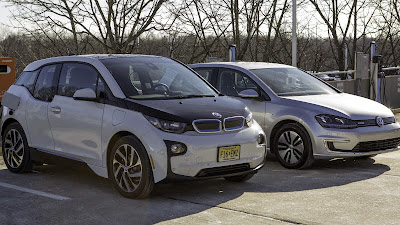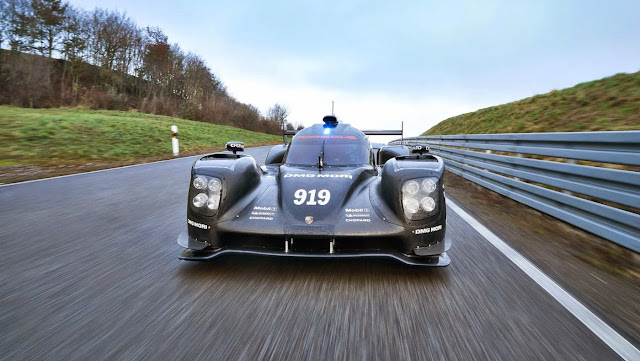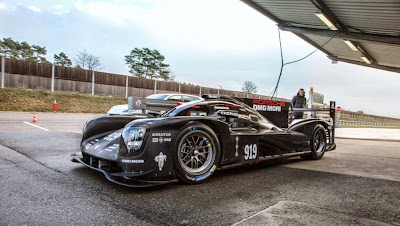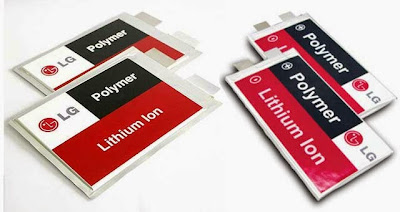 The stations will be part of a fast-growing network run by ChargePoint, the nation’s largest, and will be compatible with nearly all electric vehicles on the road.
The stations will be part of a fast-growing network run by ChargePoint, the nation’s largest, and will be compatible with nearly all electric vehicles on the road. BMW, Volkswagen and ChargePoint Join Forces to Instal DC Fast Charging Network on East and West Coasts
At the 2015 Washington Auto Show, two of the top automakers, BMW of North America and Volkswagen of America, together with ChargePoint, the largest electric vehicle charging network, announced an initiative to create express charging corridors along heavily-traveled routes on the East and West Coasts. Designed to increase the number of fast charging locations, the initiative will help meet the large and growing demand for convenient, publicly available electric vehicle fast chargers, including direct current (DC) Fast charging locations, and support the adoption of electric vehicles in the United States. In the initial phase, the aim is to install nearly 100 DC Fast charging ports across both coasts, with plans to expand the program to increase access to fast charging across the country. These newly installed DC Fast chargers will be added to the growing ChargePoint network of more than 20,000 charging spots in North America.
With more than 280,000 electric vehicles sold in the United States, EV owners need more charging flexibility while on the go. The express charging corridors will provide electric vehicle drivers access to DC Fast chargers along the most heavily populated and highly-trafficked regions on Interstate 95 on the east coast, from Boston to Washington, D.C., and on the west coast covering and connecting the metropolitan areas of Portland, San Francisco, Los Angeles, and San Diego. The installations will occur both within and between relevant metro areas, strategically-spaced at a maximum of 50 miles apart, making it even easier to take long road trips in an EV.
"A robust network of conveniently located DC Fast charging stations will go a long way toward increasing electric vehicle adoption and making electric vehicle ownership even more enjoyable," said Robert Healey, Head of EV Infrastructure at BMW of North America. "The express charging corridors are another important step in the development of the U.S. e-mobility infrastructure that makes longer distance travel a real option for consumers, particularly along the most heavily trafficked portions of both coasts-making the BMW i3 and other electric vehicles even more appealing."
"Volkswagen believes in a holistic approach to e-mobility in order to create a seamless experience for the consumer," said Jörg Sommer, vice president, product marketing and strategy, Volkswagen of America. "The investment in the express charging corridor will provide e-Golf and other electric vehicle owners with the added support to travel their day-to-day and popular long distance routes."
Each fast charging location along the express charging corridors is expected to include up to two 50 kW DC Fast chargers, or 24 kW DC Combo Fast chargers with the SAE Combo connector, used in both BMW and Volkswagen electric vehicles as well as many other electric vehicles that incorporate a DC Fast Charging capability. When charging at a 50 kW station, both the BMW i3 and the Volkswagen e-Golf can charge up to 80 percent in 20 minutes. Both vehicles can charge up to 80 percent in 30 minutes at a 24 kW station. Locations will also include Level 2 chargers, currently the most commonly available public charging stations, which are compatible with all electric vehicles. Level 2 stations can dispense up to 25 miles of range per hour of charging, providing a full charge for the BMW i3 and the VW e-Golf within 3.5 to 4 hours.
The DC Fast charging stations will be part of the ChargePoint network and can be easily accessed with a ChargePoint or ChargeNow card or with the ChargePoint mobile app.
"Our goal at ChargePoint is to get everyone behind the wheel of an EV and provide EV charging everywhere they go," said Pasquale Romano, ChargePoint CEO. "With strategically-placed stations where drivers need them, these express charging corridors will give EV drivers the freedom to go farther and have an EV as their only car without limitation."
Installations have already begun on the west coast, with the first location in San Diego County. There is a target of nearly 100 DC Fast charging ports in the first phase, available by the end of 2015. DC Fast chargers along the express charging corridors are expected to be installed in convenient locations such restaurants, shopping centers, rest stops, and more. ChargePoint will leverage its existing customer base and knowledge on usage to pick strategic locations either where drivers currently charge, or to fill in spaces where there is currently a lack of infrastructure.
With the investment, BMW, Volkswagen and ChargePoint are providing drivers with the ability and confidence to enjoy longer distance driving and recharge their electric vehicles quickly, ultimately leading to greater electric vehicle adoption.
Porsche Pajun Due in 2018/19 as a pure electric car
Announced last year, the second sedan manufacturered by Porsche will not be sold until 2018. A source quoted by the German magazine Auto Motor & Sport says the small Panamera could become the first electric car from the German manufacturer.
Apparently, Porsche believe that in four years time battery technology will advance to allow ranges from at least 350 to 400 kilometers.
The E-Pajun is expected to be a four-seater significantly smaller than the Panamera.
Track debut for 2015 Porsche 919 Hybrid
Extensive testing with the second generation of Porsche’s Le Mans prototype began on January 18, on Abu Dhabi’s Yas Marina Circuit. As scheduled, this marks the start of the 2015 motorsport season for the Porsche Team. The new Porsche 919 Hybrid has already had its roll-out on the Weissach test track. As a next step, there will be several performance and endurance tests before the WEC season opener on April 12 in Silverstone, Great Britain.
The new Porsche 919 Hybrid is a comprehensive evolution of the successful car that made its debut in 2014. It will feature the same innovative drivetrain concept consisting of a 2-litre V4 turbocharged petrol engine, an electric motor powering the front wheels, and two energy recovery systems. The new generation car had its first roll-out on December 15, 2014.
BMW sell almost 18,000 “i” vehicles in 2014 and ramp up production
Around 17,800 customers have taken delivery of a BMW i vehicle in 2014. Global deliveries of the BMW i3 total 16,052; nearly three-quarters of those sales occurred in the second half of the year, following the vehicle’s late-spring market launch in several major markets including the USA. The keys to a total of 1,741 BMW i8s have been handed over to customers since it went on sale in the summer.
Due to the success of the BMW i vehicles, their production continues to ramp up. Harald Krüger, Member of the Board of Management of BMW AG responsible for Production said,
“Our production lines in Leipzig are highly flexible and we have switched more production to the i8 to reduce customer waiting times to a better level. Meanwhile, more than 100 BMW i3’s leave the plant each day. The BMW Group is the first automotive company to manufacture using significant quantities of carbon fibre in series production and the success of these cars speaks for itself.”
BMW plans to offer plug-in hybrid versions of all their main models including Mini and Rolls Royce brands.
Source: BMW
Honda Introduces Vehicle Powered by Hydrogen
Tesla Chief Asks Makers to Support Electric Cars
Korean Companies Hold 41% of Global Automotive Battery Patents
Korean companies are building up a solid lead in the market for electric vehicle batteries.
According to a market report on automotive batteries published by SNE Research on January 12, Korean companies held a 41 percent share of automotive battery patents as a percentage of the global total. LG Chem held 757 patents among 4,427 patents in 2014, accounting for 17.1 percent of all global patents. Samsung SDI owned 528 patents, accounting for 11.9 percent, while Hyundai Motor owned 244.
Japan’s Hitachi, a rival of Korean companies in the automotive battery industry, accounted for 7.9 percent of global patents, owning 349 patents in 2014. Toyota owned 242 patents, accounting for 5.5 percent of all patents. The share of patents owned by Japanese companies was no more than 60 percent of the share owned by Korean companies in 2014. Tesla Motors in the U.S. owned 65 patents, accounting for 1.5 percent of all patents.
U.S. companies owned 1,428 patents overall while Korean companies owned 1,039 patents. Japanese companies owned 989 patents and European companies held 569 patents in 2014.
Patents categorized to be concerning automotive batteries are related to technologies in assembly, cooling modules, durability, battery management, capacity control and thermal control.
Kenny Kim, CEO of SNE Research, said that based on the report, battery focused companies will take the lead in the automotive battery market in the future, replacing automobile companies.






